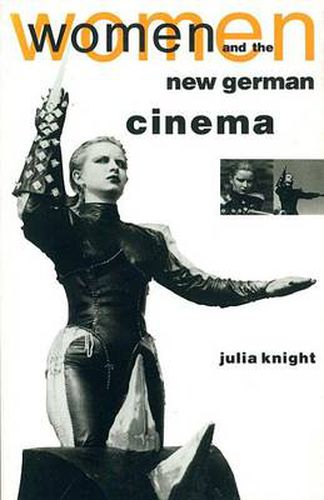Readings Newsletter
Become a Readings Member to make your shopping experience even easier.
Sign in or sign up for free!
You’re not far away from qualifying for FREE standard shipping within Australia
You’ve qualified for FREE standard shipping within Australia
The cart is loading…






There were virtually no women film directors in germany until the 1970s. today there are proportionally more than in any other film-making country6, and their work has been extremely influential. Directors like Margarethe von Trotta, Helma Sanders-Brahms, Ulrike Ottinger and Helke Sander have made a huge contribution to feminist film culture, but until now critical consideration of New German Cinema in Britain and the United States has focused almost exclusively on male directors such as Rainer Werner Fassbinder and Wim Wenders. In Women and the New German Cinema Julia Knight examines how restrictive social, economic and institutional conditions have compounded the neglect of the new women directors. Rejecting the traditional auteur approach, she explores the principal characteristics of women’s film-making in the 1970s and 1980s, in particular the role of the women’s movement, the concern with the notion of a ‘feminine aesthetic’, women’s entry into the mainstream, and the emergence of a so-called post-feminist cinema. This timely and comprehensive study will be essential reading for everyone concerned with contemporary cinema and feminism.
$9.00 standard shipping within Australia
FREE standard shipping within Australia for orders over $100.00
Express & International shipping calculated at checkout
There were virtually no women film directors in germany until the 1970s. today there are proportionally more than in any other film-making country6, and their work has been extremely influential. Directors like Margarethe von Trotta, Helma Sanders-Brahms, Ulrike Ottinger and Helke Sander have made a huge contribution to feminist film culture, but until now critical consideration of New German Cinema in Britain and the United States has focused almost exclusively on male directors such as Rainer Werner Fassbinder and Wim Wenders. In Women and the New German Cinema Julia Knight examines how restrictive social, economic and institutional conditions have compounded the neglect of the new women directors. Rejecting the traditional auteur approach, she explores the principal characteristics of women’s film-making in the 1970s and 1980s, in particular the role of the women’s movement, the concern with the notion of a ‘feminine aesthetic’, women’s entry into the mainstream, and the emergence of a so-called post-feminist cinema. This timely and comprehensive study will be essential reading for everyone concerned with contemporary cinema and feminism.